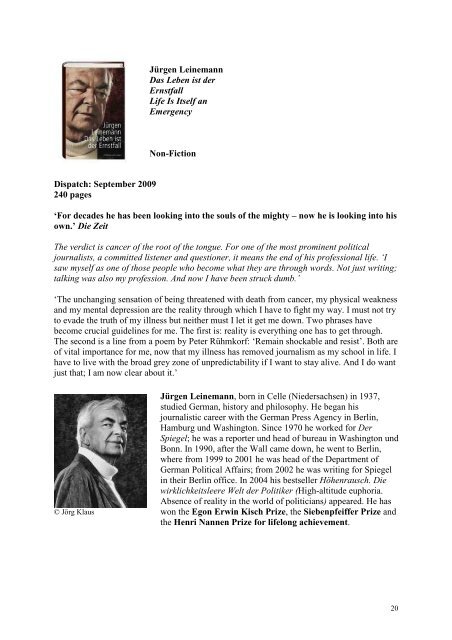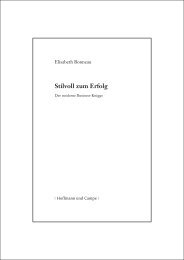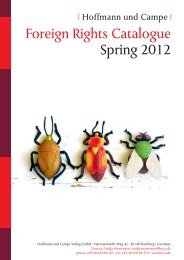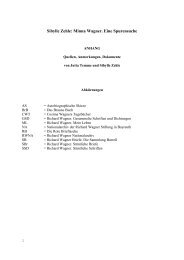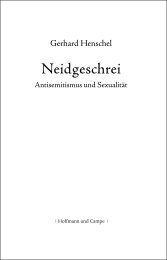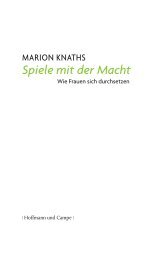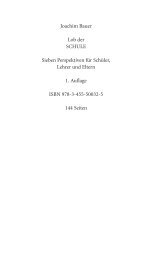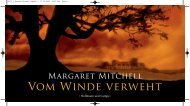Contents - Hoffmann und Campe Verlag
Contents - Hoffmann und Campe Verlag
Contents - Hoffmann und Campe Verlag
You also want an ePaper? Increase the reach of your titles
YUMPU automatically turns print PDFs into web optimized ePapers that Google loves.
Dispatch: September 2009<br />
240 pages<br />
Jürgen Leinemann<br />
Das Leben ist der<br />
Ernstfall<br />
Life Is Itself an<br />
Emergency<br />
Non-Fiction<br />
‘For decades he has been looking into the souls of the mighty – now he is looking into his<br />
own.’ Die Zeit<br />
The verdict is cancer of the root of the tongue. For one of the most prominent political<br />
journalists, a committed listener and questioner, it means the end of his professional life. ‘I<br />
saw myself as one of those people who become what they are through words. Not just writing;<br />
talking was also my profession. And now I have been struck dumb.’<br />
‘The unchanging sensation of being threatened with death from cancer, my physical weakness<br />
and my mental depression are the reality through which I have to fight my way. I must not try<br />
to evade the truth of my illness but neither must I let it get me down. Two phrases have<br />
become crucial guidelines for me. The first is: reality is everything one has to get through.<br />
The second is a line from a poem by Peter Rühmkorf: ‘Remain shockable and resist’. Both are<br />
of vital importance for me, now that my illness has removed journalism as my school in life. I<br />
have to live with the broad grey zone of unpredictability if I want to stay alive. And I do want<br />
just that; I am now clear about it.’<br />
© Jörg Klaus<br />
Jürgen Leinemann, born in Celle (Niedersachsen) in 1937,<br />
studied German, history and philosophy. He began his<br />
journalistic career with the German Press Agency in Berlin,<br />
Hamburg <strong>und</strong> Washington. Since 1970 he worked for Der<br />
Spiegel; he was a reporter <strong>und</strong> head of bureau in Washington <strong>und</strong><br />
Bonn. In 1990, after the Wall came down, he went to Berlin,<br />
where from 1999 to 2001 he was head of the Department of<br />
German Political Affairs; from 2002 he was writing for Spiegel<br />
in their Berlin office. In 2004 his bestseller Höhenrausch. Die<br />
wirklichkeitsleere Welt der Politiker (High-altitude euphoria.<br />
Absence of reality in the world of politicians) appeared. He has<br />
won the Egon Erwin Kisch Prize, the Siebenpfeiffer Prize and<br />
the Henri Nannen Prize for lifelong achievement.<br />
20


